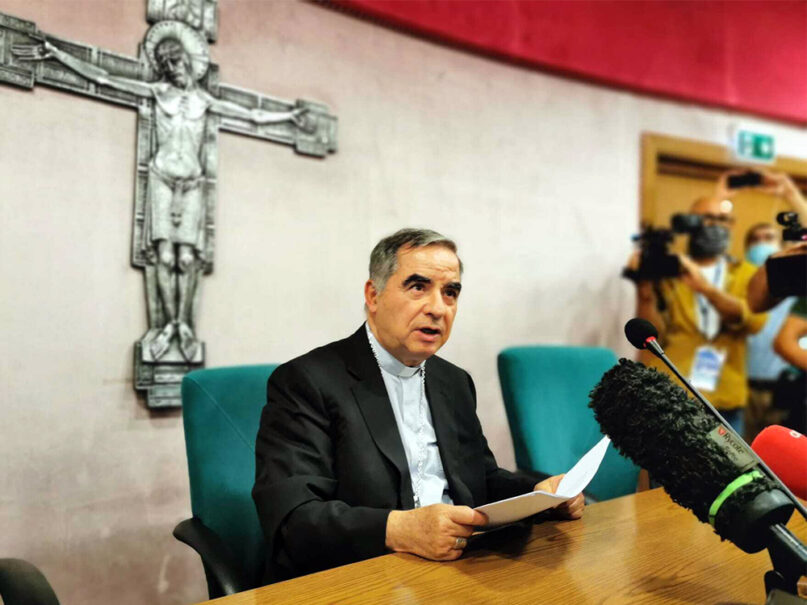
VATICAN CITY (RNS) — Italian news media published previously unseen WhatsApp messages on Monday (April 14) that hint at judicial meddling by Vatican prosecutors in the blockbuster trial of 10 defendants, including one cardinal, on charges of money laundering and embezzlement of the Catholic institution’s funds.
Besides suggesting that the prosecutors colluded with two women to manipulate a key witness, the messages point to larger issues troubling the Vatican judicial system, as they show lawyers and defendants discussing a lack of legal protections, the rule of law and due process in the small city-state ruled by the absolute monarch: the pope.
One of the women in WhatsApp exchanges, Francesca Immacolata Chaouqui, a member of a commission set up by Pope Francis to clean up the Vatican finances, was convicted in the 2017 Vatileaks II trial for leaking confidential information to journalists. Chaouqui, sometimes referred to as “the papess,” or female pope, by Italian journalists, has been a recurring character in Vatican financial scandals.
The second woman is Genoveffa Ciferri, a close confidant of Monsignor Alberto Perlasca, the trusted adviser of Cardinal Angelo Becciu, the former chief of staff to the Vatican’s secretary of state.
In December 2023, Becciu was found guilty in the Vatican trial that resulted from an opaque real estate investment by church officials using funds destined for charity that lost the institution an estimated $400 million. Perlasca, who was among the defendants during the trial, later became the key witness for the Vatican prosecutors, offering crucial evidence about the investment into a swanky London apartment building.
During the trial, held over two-and-a-half years, the defendants’ lawyers brought evidence suggesting that Perlasca was contacted by Chaouqui via WhatsApp through the intercession of Ciferri. The two women, the defense argued, had instructed Perlasca on what to say to prosecutors.

Cardinal Angelo Becciu speaks during a news conference Sept. 25, 2020, in Vatican City. (RNS photo/Claire Giangravé)
In his testimony, Perlasca admitted he had spoken with an “elderly magistrate” who he only later learned was Chaouqui. The Vatican prosecutors Alessandro Diddi and Gian Piero Milano agreed to add the messages to the evidence but redacted 119 of the 126 messages between the two women and Perlasca.
Chaouqui, the defense alleged, believed Becciu had been responsible for her conviction in the Vatileaks trial, and she therefore wanted to see him declared guilty, as he eventually was, and sentenced to five-and-a-half years’ imprisonment. Francis had previously stripped Becciu of his rights as a cardinal, but not his title.
The Italian newspaper Domani disclosed all 126 messages and many others, saying that it had obtained the unredacted material from Raffaele Mincione, an Italian entrepreneur who was also found guilty of money laundering, embezzlement and corruption in the Vatican financial trial. Mincione deposited the messages to the United Nations special rapporteur on the independence of judges and lawyers, Margaret Satterthwaite.
The editor-in-chief of Domani is Emiliano Fittipaldi, one of two journalists named, but later absolved, in the Vatileaks II trial.
In the published messages, Chaouqui appears to know the Vatican prosecutors’ strategy, predicting their line of questioning and in one message predicting that Perlasca would be acquitted.
Throughout the chats — but also in her public tweets — Chaouqui often stated that she was acting on behalf of Pope Francis. The pope was called into question several times by the defendants during the financial trial for issuing decrees known as motu proprio that intervened at key points of the trial.
Even after the communications between Chaouqui and Perlasca became known in the trial, the two women kept up their text exchanges. “We need to decide what you have to say,” Chaouqui reportedly wrote to Ciferri. “To prevent the chats from being considered reliable if they ever decided to disclose them. Because in this case Becciu would be right. The bomb must be defused.” She added, “For me, what I said at the trial is valid. I don’t know Diddi. If it turns out that we were all in agreement, it’s the end.”
In a statement released Monday, Becciu expressed “deep dismay” regarding the reports. “From the very first moment I spoke of a plot against me: an investigation built on falsehoods, which five years ago unjustly devastated my life and exposed me to a pillory of global proportions. Now, finally, I hope that the time of deception has come to an end,” it read.
Becciu said he has asked his lawyers to pursue every legal avenue to shed light on the subject. Mincione also denounced the “lack of impartiality and the manipulation of the main witness to the prosecutors,” saying it undermines the credibility of the entire trial and sentence.
What had been dubbed as “the Vatican trial of a century” has become in its own way a test of the Catholic state’s ability — or lack thereof — to administer justice. The trials and scandals that have rocked the city-state for decades, starting with the Vatileaks I trial in 2012, have demonstrated the institution’s efforts to modernize its judicial branch, but the recent revelations highlighted the Catholic monarchy’s continued challenges and failures.
